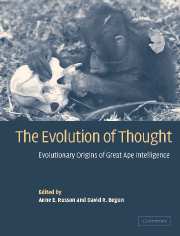Book contents
- Frontmatter
- Contents
- List of Contributors
- Preface
- 1 Evolutionary reconstructions of great ape intelligence
- 2 Enhanced cognitive capacity as a contingent fact of hominid phylogeny
- PART I COGNITION IN LIVING GREAT APES
- PART II MODERN GREAT APE ADAPTATION
- PART III FOSSIL GREAT APE ADAPTATIONS
- Introduction
- 13 Paleoenvironments and the evolution of adaptability in great apes
- 14 Cranial evidence of the evolution of intelligence in fossil apes
- 15 Life history and cognitive evolution in the apes
- 16 Fossil hominoid diets, extractive foraging, and the origins of great ape intelligence
- 17 Paleontology, terrestriality, and the intelligence of great apes
- 18 Body size and intelligence in hominoid evolution
- Part IV INTEGRATION
- Author index
- Species index
- Subject index
16 - Fossil hominoid diets, extractive foraging, and the origins of great ape intelligence
Published online by Cambridge University Press: 20 August 2009
- Frontmatter
- Contents
- List of Contributors
- Preface
- 1 Evolutionary reconstructions of great ape intelligence
- 2 Enhanced cognitive capacity as a contingent fact of hominid phylogeny
- PART I COGNITION IN LIVING GREAT APES
- PART II MODERN GREAT APE ADAPTATION
- PART III FOSSIL GREAT APE ADAPTATIONS
- Introduction
- 13 Paleoenvironments and the evolution of adaptability in great apes
- 14 Cranial evidence of the evolution of intelligence in fossil apes
- 15 Life history and cognitive evolution in the apes
- 16 Fossil hominoid diets, extractive foraging, and the origins of great ape intelligence
- 17 Paleontology, terrestriality, and the intelligence of great apes
- 18 Body size and intelligence in hominoid evolution
- Part IV INTEGRATION
- Author index
- Species index
- Subject index
Summary
The History of every major Galactic Civilization tends to pass through three distinct and recognizable phases … the first phase is characterized by the question How can we eat? the second by the question Why do we eat? and the third by the question Where shall we have lunch?
Douglas Adams, The Hitchhiker's Guide to the GalaxyINTRODUCTION
Ecological hypotheses for the evolution of great ape intelligence relate selective pressures for increased intelligence to biological and environmental parameters such as body size, metabolic rate, life history, diet, home range size, habitat stratification, and predation risk (Clutton-Brock & Harvey 1980; Dunbar 1992; Gibson 1986; Milton 1981, 1988; Sawaguchi 1989, 1992). Of these, diet is the ecological selective pressure most frequently invoked to explain the emergence of great ape cognitive abilities. A correlation between diet and relative brain size in primates has long been established; frugivorous primates tend to have relatively larger brains than closely related folivorous taxa (Clutton-Brock & Harvey 1980; Milton 1981, 1988; Sawaguchi 1992). This pattern was most often explained in terms of the differing nutritional properties of fruits and leaves. A high-energy, fruit-based diet, it was thought, released energetic and metabolic constraints, allowing accelerated neonatal brain growth and maintenance of relatively greater adult brain mass (Jolly 1988; Martin 1981). However, the expansion of energy-hungry brain tissue will occur only where it confers an immediate adaptive advantage (Dunbar 1992). In other words, adequate energy supply is a necessary precondition for, but not in itself a sufficient stimulus to, increased encephalization.
Researchers seeking such a stimulus have tended to focus upon the adaptive role of intelligence in solving the unique foraging problems posed by primate diets.
- Type
- Chapter
- Information
- The Evolution of ThoughtEvolutionary Origins of Great Ape Intelligence, pp. 298 - 319Publisher: Cambridge University PressPrint publication year: 2004
- 4
- Cited by



